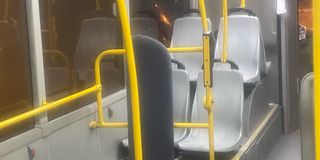FIVB World Championships Notebook - Day 5

Plastic seats inside a bus used for public transport in Belgrade, Serbia on September 19, 2022.
What you need to know:
- The Danube River cuts through Belgrade and locals have to go over the Pupin bridge to cross over to the other side of the city. The Pupin bridge was built by the Chinese and named after Serbian investor Mihajlo Pupin.
- Rakija is a special whiskey-like drink that is found in almost every home in Serbia.
Public transport is mainly buses but Serbians don’t pay
*****
The public transport system here is mainly through buses and it’s managed by the city council authority. The buses have two cabins with plastic seats fixed on either side leaving a huge space in the middle where people can stand when the bus is fully occupied. The doors are located at the middle where the two cabins merge and also at the tail end. At the entrance, there is a machine that is automated such that people can pay through cards and get their tickets. However, some notorious locals have formed a habit of not paying and since there is no one monitoring them, majority get away with it. Only the few honest ones pay for their fare. In fact, it’s safe to say only three out of 10 Serbs in Belgrade pay for their fare. It’s almost a miracle that this bus service owned by the government is still in operation.
Home-made Rakija preferred by locals
*****
Rakija is a special whiskey-like drink that is found in almost every home in Serbia. It is normally brewed at home and also commercially. Locals prefer the home-brewed Rakija since it’s sweeter and smoother. It can be made from apples, plums or even pears. If not stored in a barrel, it’s colourless but if stored in barrels it gets a brownish colour. Normally, it’s taken dry and in tots then washed down the throat with a glass of water. Yours truly has already sampled it and endorsed it as one of the best things from Serbia and will be carrying a bottle or two home.
Kovilovo Sports Centre, home of Serbian sport
*****
Malkia Strikers have been camping at Kovilovo Sports Centre since Day One. It’s a state of the art facility sitting on over 30 hectares of land, found in the Belgrade suburbs, around 12 kilometers from the Serbian capital. It has two football pitches, futsal outdoor turf, multi-functional sports hall, gymnasium, outdoor courts for basketball, volleyball, tennis and handball, swimming pool, five-star hotel, conference rooms, spa and sauna etc. Most Serbian national teams camp here when preparing for international competitions and almost every big Serbian sports personality has trained at Kovilovo from Novak Djokovic, Vladimir Grbic, Nemanja Matic etc.
Danube River, largest water body in Serbia
*****
Serbia is a landlocked country but takes pride in the Danube river which passes through nine other European countries: Germany, Austria, Slovakia, Hungary, Croatia, Bulgaria, Romania, Moldova, and Ukraine. There are boats that ferry people from one end to the other across the Danube River since increased pollution and human activity makes it unsafe to swim across. The Danube River cuts through Belgrade and locals have to go over the Pupin bridge to cross over to the other side of the city. The Pupin bridge was built by the Chinese and named after Serbian investor Mihajlo Pupin.





